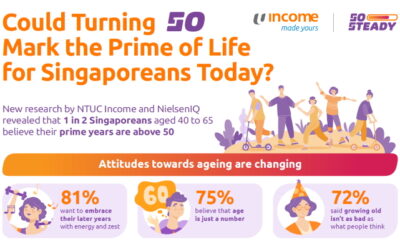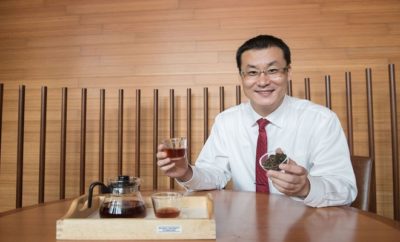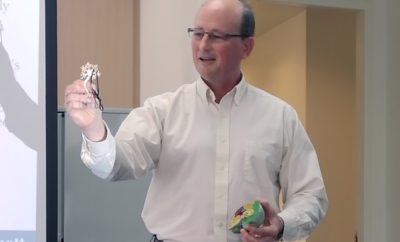
Health x Wellness
Dr Femke Hannes shares about Healthy ageing in Singapore
At the inaugural Healthy Ageing APAC Summit, Dr. Femke Hannes, Regional lead for Nutrition, Science, and Advocacy for DSM Nutritional Products Asia-Pacific talked about how Singaporeans can control certain factors in their ageing process. She also shared about how micronutrients play a part in the healthy ageing journey.
“Growing old in a healthy way is possible, and we should add health to our years,” said Dr. Hannes.
We speak with Dr. Hannes about what’s controllable about the ageing process and how to prepare for healthy ageing.
the Active Age (AA): What is your definition of healthy ageing?
Dr. Femke Hannes (FH): Healthy ageing is all about keeping the body running smoothly. It’s also about reducing the risk of age-related diseases and maintaining mobility, mental performance, and eye health.
Too often people think of ageing as a bad thing. It shouldn’t be! If you maintain a balanced diet as you age, you can prevent costly medical bills and enjoy your later years.
AA: What are the common pains for again people in Singapore?
FH: Some of the common diseases found in the elderly are osteoporosis, poor vision, heart problems, reduced muscle mass, dementia and diabetes. Malnutrition, a condition caused by poor diet and lack of nutrients, can be a factor. One-third of elderly Singaporeans are at risk of being malnourished, a rate on par with other affluent countries such as Germany and the Netherlands. Malnourished seniors are three times more susceptible to infections and likely stay longer in the hospital.
We know that on average seniors are living about 7 years in bad health, often because of age-related, chronic diseases that reduce quality of life.
AA: What are the controllable and uncontrollable aspects of ageing?
FH: Many factors, including genetics, are likely to affect the way we age. But there are some things we can control, like diet, for example. Adequate nutrition is important for maintaining independence and living long, healthy and active lives. A study on elderly populations in certain areas of Japan and Italy, where people are known for high quality of life well into old age, showed that diet is a key driver. They have a high intake of fruit and veggies, fish and other sources of poly unsaturated fat, and low intake of saturated fat and meat. This type of low-energy yet nutrient-dense diet is key for healthy ageing and can reduce the risk of age-related chronic disease.
AA: At what age should you start preparing for healthy ageing?
FH: Healthy choices as early as age 45, for example, can give a long-term boost and help people develop and keep good habits. However, people can start preparing for healthy ageing from the moment that they are born! Don’t wait until old age to start making healthy choices.
AA: What are some challenges that older Singaporeans face when it comes to good nutrition?
FH: Reduced appetite, difficulty swallowing, and diminished ability to taste are some of the challenges that can come with age. Seniors should make sure they get enough energy and nutrients through balanced diet, fortified foods, or easy-to-swallow beverages fortified with nutrients.
AA: What are the essential nutrients that your body requires as you age?
FH: To protect your eyes against age-related macular degeneration, cataracts, and retinitis pigmentosa, eat more green, leafy vegetables that contain Lutein and zeaxanthin.
For maintaining your metabolism and for your brain, salmon is a great source of Omega 3 fatty acids. If you are using Omega 3 supplements, look for a complete source with both DHA and EPA.
People who take at least 200IU of Vitamin E per day have 37% lower risk of developing cardiovascular diseases. It may also boost brain health. Almonds, sunflower oil, and hazelnuts naturally contain Vitamin E.
Vitamin D is important for mental health, healthy bones, reduced risk of cardiovascular disease and type 2 diabetes. The sun is the best natural source of Vitamin D.
AA: Besides nutrition, what are some healthy ageing habits for Singaporeans to adopt?
FH: Staying active is an important part of being healthy. The Singapore Health Promotion Board recommends that adults above 50 years of age aim for 150 minutes of “moderately” intense activity a week.
Maintaining good mental health and keeping a sharp mind also contribute to quality of life. Exercising the brain by reading or taking on a new skill can help improve the cognitive health of seniors. Paired with sufficient intake of antioxidants like Vitamin E, Vitamin C, and β-Carotene, this can reduce the likelihood of onset of depressive symptoms.
Dr. Femke Hannes is the regional lead for Nutrition, Science, and Advocacy for DSM Nutritional Products Asia-Pacific. As a scientist, she holds a doctoral degree in biomedical sciences focusing on human health.









